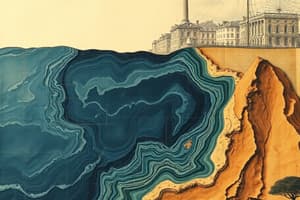Podcast
Questions and Answers
What is 70% of the planet’s surface made up of ________?
What is 70% of the planet’s surface made up of ________?
oceanic basins
What do you call a large submerged volcanic mountain rising from the ocean floor?
What do you call a large submerged volcanic mountain rising from the ocean floor?
- Guyot
- Oceanic Basins
- Seamount (correct)
- Mid Oceanic Ridge
All Guyots were once seamounts.
All Guyots were once seamounts.
True (A)
What is a small elevated landform that rises from the depth of the ocean?
What is a small elevated landform that rises from the depth of the ocean?
________ is a structure in the ocean on which it didn't reach the surface and kept its mountain-like shape.
________ is a structure in the ocean on which it didn't reach the surface and kept its mountain-like shape.
Describe the process of how Guyots get their flat tops.
Describe the process of how Guyots get their flat tops.
Ano ang kasaysayan ng wika?
Ano ang kasaysayan ng wika?
Bakit mahalaga ang wika?
Bakit mahalaga ang wika?
Ilan ang iba’t ibang dayalekto o wikain sa Pilipinas?
Ilan ang iba’t ibang dayalekto o wikain sa Pilipinas?
Ang Panahon ng Amerikano ay nagdala ng edukasyon sa Pilipinas.
Ang Panahon ng Amerikano ay nagdala ng edukasyon sa Pilipinas.
Sino ang mga pangunahing tao sa Kilusang Propaganda?
Sino ang mga pangunahing tao sa Kilusang Propaganda?
Ano ang ipinapatupad ng Order Militar Blg. 13?
Ano ang ipinapatupad ng Order Militar Blg. 13?
Flashcards are hidden until you start studying
Study Notes
Ocean Basins
- Ocean basins cover approximately 70% of Earth's surface and hold most of the planet's water.
- These regions are situated below sea level and contain various underwater features.
Oceanic Ridges
- Formed when tectonic plates diverge, creating gaps for magma from the mantle to rise.
- Magma solidifies upon cooling, generating a new layer of ocean crust.
- Oceanic ridges are continuous submarine mountain chains and the largest features in ocean basins.
Abyssal Hills
- Raised features in ocean basins that rise from deep ocean floors.
- Typically grow to about 500 feet in height and a few miles in width.
- Formed mainly through volcanism and block faulting, with the influence of spreading rates.
Guyots
- Submerged volcanic mountains with flat tops, shaped by erosion from waves and other processes.
- Differ from seamounts as guyots once reached the surface before being eroded away.
Seamounts
- Large submerged volcanic mountains that rise from the ocean floor, can reach heights of up to 10,000 feet.
- Seamounts never emerged above sea level, retaining their mountain shape.
Evolution of Ocean Basins
- Ocean basins have changed over geologic time, influenced by the movement of tectonic plates for approximately 200 million years.
- The breakup of the supercontinent Pangaea initiated recent ocean basin growth.
- The oldest oceanic crust is found in the western equatorial Pacific, near the Mariana Island arc.
Age of Ocean Floors
- The Pacific Ocean floor's crust formed during seafloor spreading, linked to historical patterns of ridges and tectonic activity.
- The western Philippine Sea floor developed between 60 and 35 million years ago, with new formations occurring from 30 million years ago.
Communication
History and Importance of Language
- The study of language history offers insights into how languages evolve over time, their interconnections, and their impacts on culture and society.
- Language is a crucial part of cultural identity, serving as a means to express ideas, emotions, and experiences.
- Language facilitates communication, knowledge sharing, and community building among individuals.
Languages in the Philippines
- The Philippines is one of the countries with the highest number of dialects and languages, with over 400 distinct languages across more than 7,000 islands.
- Each region has its own languages or dialects, leading to challenges in communication among different groups.
Periods of Language Influence in the Philippines
Spanish Colonial Period
- The Spanish colonization lasted for over 300 years, during which Spanish was the primary language of propaganda and nationalism.
- The Propaganda Movement emerged, led by figures such as Dr. Jose Rizal, Graciano Lopez, Juan Luna, and Antonio Luna, igniting a sense of national pride.
- Dr. Rizal emphasized the importance of language in fostering understanding and unity among Filipinos.
American Colonial Period
- The American occupation introduced the concept of education, contrasting the Spanish approach.
- English was chosen as the medium of instruction in public schools; Thomasites (American soldiers) were the primary teachers.
- Despite English being the main language of instruction, vernacular languages continued to serve as auxiliary languages in education.
Japanese Occupation Period
- During the Japanese occupation, strict media controls prompted Filipinos to strengthen their use of native languages amidst language policy challenges.
- The use of native languages, particularly Tagalog, was emphasized in schools, leading to an increase in local literature.
- Japanese authorities attempted to eliminate American influence by declaring Tagalog and Japanese as official languages through Military Order No. 13.
Studying That Suits You
Use AI to generate personalized quizzes and flashcards to suit your learning preferences.




